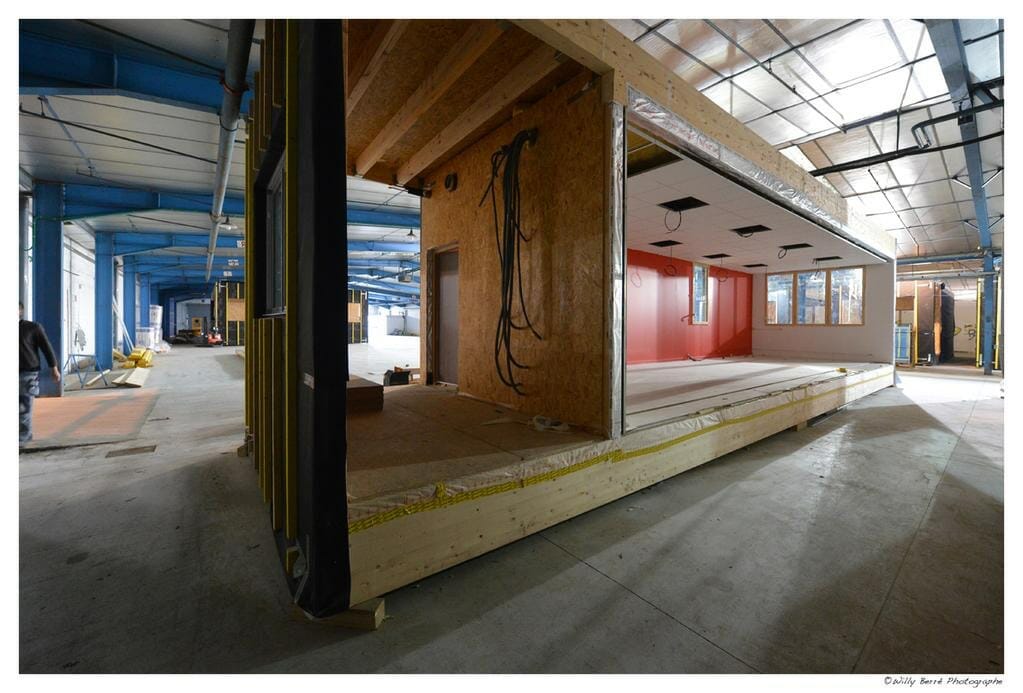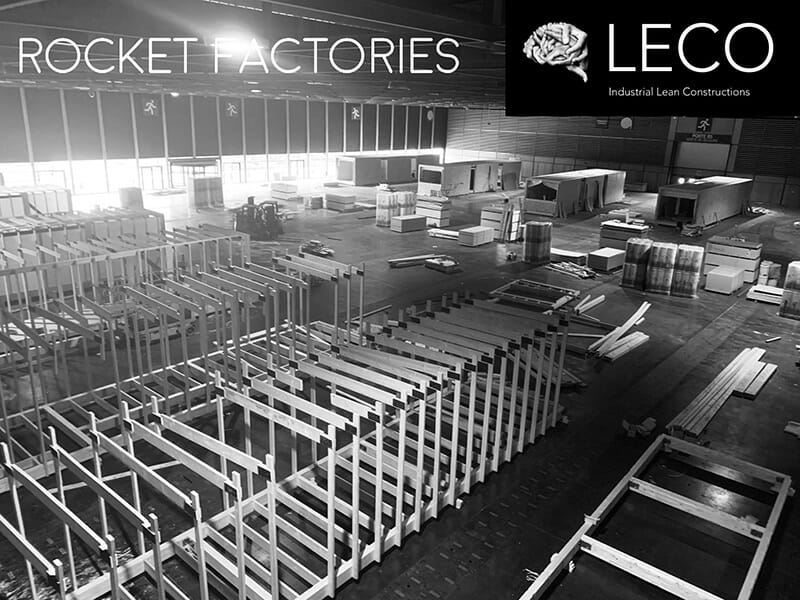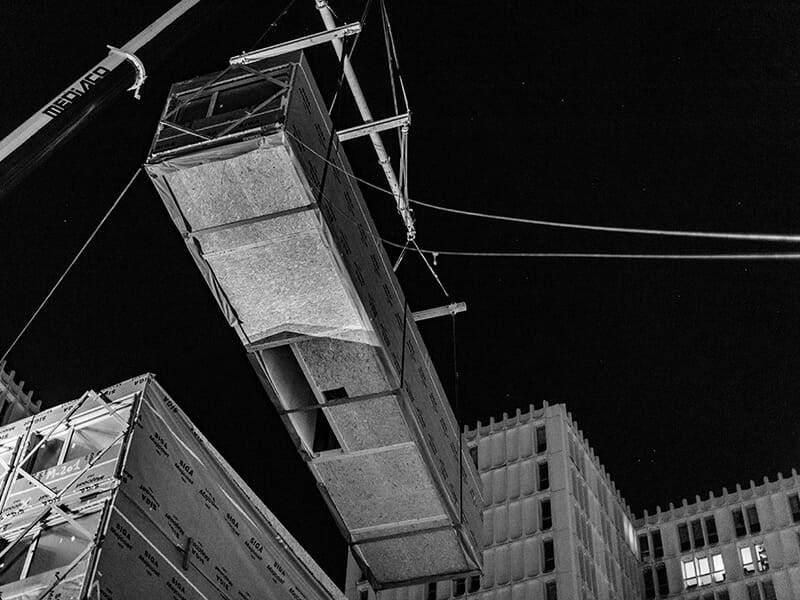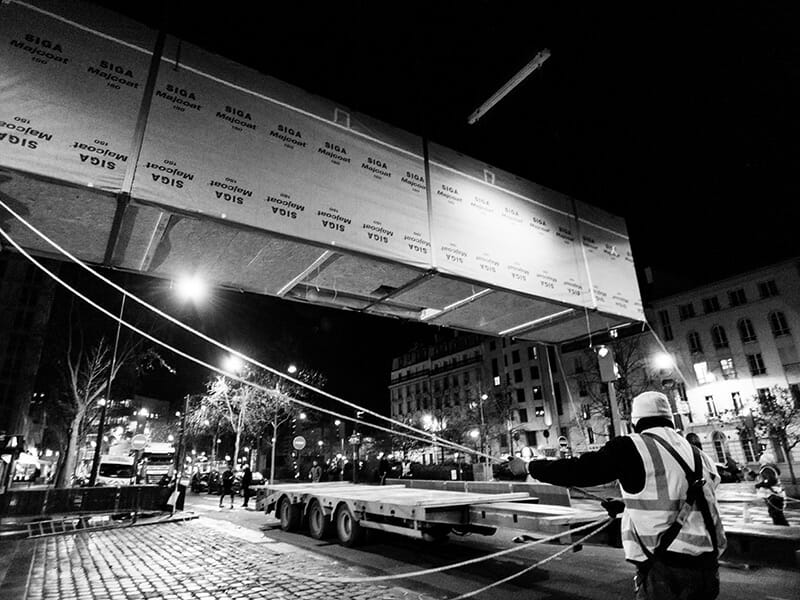Industrializing European Modular Construction with Pop-Up Factories

Xavier Jaffray is the founder and president of LECO, a modular construction company in France. The Leco group specializes in the design and construction - in an industrial environment - of carbon-free buildings exclusively based on wood.
Before Xavier Jaffray launched LECO, a modular construction company, in France in 2013, he held management positions in both Toyota and Bic factories. He’d seen industrialized manufacturing up close. When he began researching the construction industry, he found that the companies that manufacture components for buildings — such as roof trusses, wall panels, and windows — are industrialized, but there was no industrialization in design and construction.
“Industrialization is based on the idea of manufacturing the same product over and over again, every day,” Jaffray says. Conventional construction doesn’t repeatedly produce the same product, so it doesn’t gain the efficiencies of industrialization. Part of the problem is that construction is necessarily localized and project-based. A social housing project here, a student dorm project there, a hotel project somewhere else.
Just because modular construction takes place in a factory, that by itself doesn’t mean it’s industrialized. “A real estate company might order 200 identical modules. But 200 units is not a mass-produced product,” Jaffray says.

A constant stream of identical products is typical of industrial manufacturing. When a factory isn’t producing anything, it continues to incur overheads, which is clearly inefficient. So, a challenge for modular construction companies is to eliminate factory overheads between projects. One way to do this is to have constant demand so there are no gaps between projects. This is ideal, but it’s not something a company can control. Another way is by eliminating the factory when there’s no demand. This is the route LECO has taken.
Going Local with Pop-Up Factories
“The construction market requires agility,” says Jaffray. That is, construction companies need to adapt quickly to the location and volume of demand, without incurring overhead when there’s no demand for the product. Jaffray’s solution is novel. He uses what we might call ‘pop-up’ factories or what he sometimes calls ‘flying’ or ‘rocket’ factories near the project sites. LECO rents a large open space in a building, such as a warehouse or exhibition hall, to use as a factory. If there’s enough demand for LECO modules in the area, then the factory may continue to operate for two, five, ten years, or more. If there’s no demand, the factory closes — eliminating overheads. For as long as the factory is open, it’s constantly producing modules.
“It doesn’t make economic sense to have a big, permanent factory producing modules in one location and then transporting them long distances,” Jaffray says. LECO ships modules up to a distance of only 100 kilometers. LECO subcontracts with local companies on each project to transport the modules, lay the foundation, and set the modules in place. Most of the suppliers are also in the same area. They also transport the biggest modules they can each time — 5 meters wide and 20 meters long. “We’ve learned that it makes economic sense to deliver the maximum value on every truck trip.”
Eliminating overheads when a project isn’t going through means that LECO has been able to lower costs so that their timber modular construction is cheaper, as well as faster, than both conventional concrete or timber construction.
“Our first project using a temporary factory was a school for 600 students. It took three months in the warehouse-factory, and one month on the site to complete.”
Since then, LECO has opened seven temporary factories in France. Just as important as the temporary factories is the simple assembly process that can be taught quickly to unskilled local workers.



Labor and Logistics
For maximum efficiency, LECO needs to be able to get people working in the temporary factories quickly. They also need to draw from the pool of labor local to each factory. This means they can’t rely on being able to find skilled workers. Having to rely on unskilled labor requires an assembly process that is very simple and quick to learn. LECO’s factories do not cut the wood for their modules (eliminating the need for cutting machines and skilled workers to operate them). The pre-cut wood is delivered to LECO’s temporary factories for assembly.
Having a number of temporary factories, instead of one permanent one, creates logistical supply chain challenges. To address these challenges, LECO formed a dedicated supply chain division. LECO is a group of four companies, each of which has a different function: supply chain; employee training; engineering; and signing the contract with the client.
“Our supply chain company buys the wood and finds a company in the vicinity of the project who can cut it,” Jaffray explains. “We get the wood delivered to that company, and give them the files they need for their cutting machines. Then, the cut pieces are delivered to our temporary factory for assembly.”
Like McDonald's
Jaffray wants LECO to grow without becoming a huge company with high overhead. The way they’re doing this is by selling LECO licenses. “For those who buy a LECO license, we provide the engineering, we deliver the pre-cut components, and we train the employees. But they sign the contracts with their clients and employees, and they arrange for delivery and installation of the modules.”
LECO currently has two licensees in Germany and is working on getting licensees in the UK and the US. “I’m looking for people in the US who want to change the world,” Jaffray says with a laugh.
He compares his licensing business model to McDonald’s franchising. McDonald’s doesn’t have a huge factory where it manufactures Bic Macs to ship long distances to every McDonald’s restaurant. “McDonald’s franchisees hire unskilled workers locally at each restaurant. Those workers make the same products in all the different locations, using a simple process, with ingredients from the local supply chain. The restaurants in all their locations then serve the exact same products,” Jaffray says.
Recent and Upcoming Projects
Last year, in the heart of Paris, LECO built a three-story student dormitory on top of an existing three-story building. “With 400 people living within 100 meters of the construction site, there were concerns about construction noise over a long period,” Jaffray says. But LECO completed the project quickly and quietly.
For a month and a half, an exhibition hall in the north of Paris wasn’t holding any events. “So we rented the space for that period between two exhibition events,” Jaffray explains. “We spent four nights placing the modules and the maximum noise we made was briefly 80 decibels.” (According to the Centers for Disease Control and Prevention, 80 decibels is the same volume as city traffic from inside a car, and is significantly quieter than a motorcycle.)
For the 2024 Olympic Games in Paris, LECO will rent space from a large trade show company to build accommodation for 100 athletes. It’ll be needed for only two months. Like all LECO modules, they can be moved afterwards and be used for other purposes.
Jaffray explains that being able to relocate buildings is a more sustainable and economical solution than building new facilities when others are under-used. For example, an area may no longer need an elementary school building, but it now needs accommodation for college students. So instead of a building standing empty or under-used at the elementary school and building new college accommodation, the building can be relocated from the elementary school to the college.
“Relocatability is especially important for social housing,” Jaffray explains. “It’s easier and quicker to get approval if the housing is permitted for a limited period of time, eight years say, rather than permanently. That means that people can be housed sooner, but still in high quality buildings.”
About the Author: Zena Ryder is a freelance writer, specializing in writing about construction and for construction companies. You can find her at Zena, Freelance Writer or on LinkedIn.
More from Modular Advantage
AI, Faster Sets, and Automation: The Future of Modular is at World of Modular
While the modular building industry has long known that it can be an effective solution to increase affordable housing, the word is slowly spreading to more mainstream audiences. Three presentations at this year’s World of Modular in Las Vegas hope to provide insight and direction for those seeking a real solution to the crisis.
An Insider’s Guide to the 2025 World of Modular
The Modular Building Institute is bringing its global World of Modular (WOM) event back to Las Vegas, and with it comes some of the industry’s best opportunities for networking, business development, and education. Over the course of the conference’s four days, there will be numerous opportunities for attendees to connect, learn, and leverage event resources to get the most out of the conference.
Affordable Housing Now: The Industry’s Best Bring New Solutions to World of Modular
While the modular building industry has long known that it can be an effective solution to increase affordable housing, the word is slowly spreading to more mainstream audiences. Three presentations at this year’s World of Modular in Las Vegas hope to provide insight and direction for those seeking a real solution to the crisis.
Opportunities for Innovation in Modular Offsite Construction
Modular Offsite Construction has already shattered the myth that it only produces uninspired, box-like designs. Architectural innovations in module geometry, configurations, materials, and products make it possible to create visually stunning buildings without sacrificing functionality or efficiency.
Safe Modular Construction with Aerofilm Air Caster Transport
In collaboration with Aerofilm Systems, Heijmans developed innovative skids using air caster technology for moving modules easily and safely. These pallets are equipped with an auto-flow system, making operation extremely simple.
Miles, Modules, and Memes: Building a Modular Network One Flight at a Time
At the end of the day, social media is just another tool for building connections, and like any other tool, needs to be used skillfully to work properly. Use social media thoughtfully, and it will open doors to real opportunities and relationships you didn’t even see coming.
Falcon Structures: Thinking Inside the Box
Some of Falcon’s latest projects include creating container solutions for New York’s Central Park and an East Coast professional baseball team. More and more, Falcon is shipping out container bathrooms and locker rooms to improve traditionally difficult work environments, like those in oil and gas or construction.
UrbanBloc—From Passion to Industry Leader
UrbanBloc specializes in three main categories or markets – what they call “Phase 0” projects, amenities, and urban infill. Clients are often attracted to shipping containers because from a real estate perspective they are considered an asset. Having the flexibility to move and transport these assets allows owners to respond to different circumstances in a fluid manner that they can’t get with standard construction.
The Hospitality Game-Changer
“Hospitality is about more than just providing a service – it’s about delivering an experience,” says Anthony Halsch, CEO of ROXBOX. “And that’s where containers thrive. They allow us to create spaces that are unique, efficient, and sustainable.”
Container Conversions Counts on Simplicity to Provide Critical Solutions
Container Conversions has fabricated and developed thousands of containers for varied projects, including rental refrigeration options, offices, kitchens, temporary workplace housing, and mobile health clinics.










